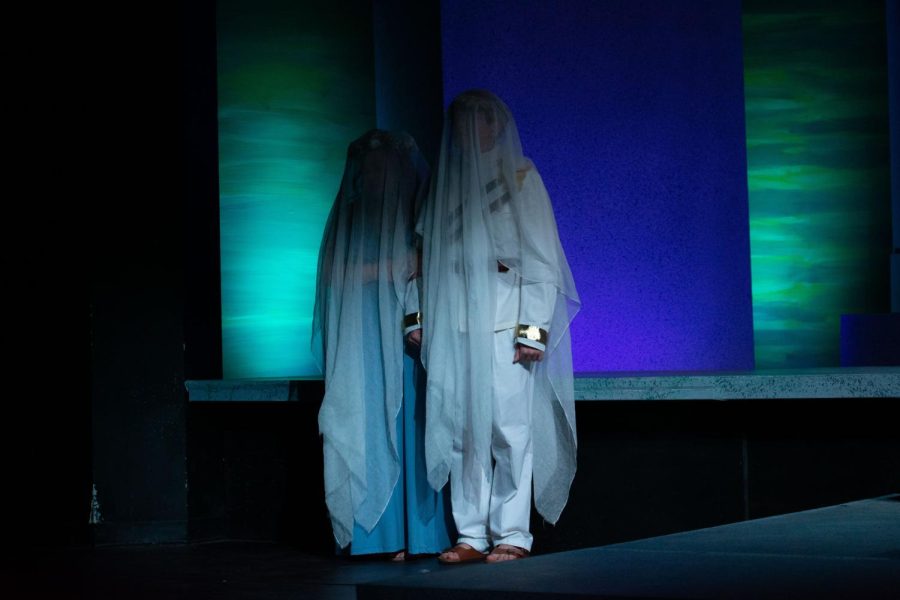Moonlight Troupers bring ‘Antigone’ into modern world
Actors Amanda Matousek and Jackson Bondurant perform in the Moonlight Troupers’ production of “Antigone,” running Nov. 11, 12, 13, 18, 19, 20 in the Kauffman Theater.
November 12, 2022
Friday night’s production of “Antigone” by Theatre AACC was the first community college play I have ever seen and it couldn’t have been a better introduction.
“Antigone” has been a classic for thousands of years, and this new translation by the play’s director, Erin Bone Steele, brought it comfortably into the modern world.
The playwright Sophocles wrote it in 441 B.C. as a sequel to his more famous work, “Oedipus Rex.”
Theatre AACC created a show that somehow walked the line between tragic and fun. Even though I had read the play before, I’ll admit I wasn’t entirely dry-eyed by the somber ending.
The protagonist and namesake of the play, Antigone, portrayed by actress Amanda Matousek, who also appeared in AACC’s 2019 production of “Romeo and Juliet,” faced off dramatically with third-year transfer student Nathan Garcia’s rendition of King Creon. They both excellently portrayed complex and stubborn motivations, making the erratic actions taken by their characters seem fitting for the situations.
Every actor in the play had a chance to shine, with the group known simply as the “chorus” containing everyone but the actors for Antigone and Creon. They served simultaneously as narrators, characters and extras. I particularly enjoyed the way they would mime out in unison the actions described by other characters.
Shannon McElwee’s brief scenes as the unnamed “guard,” were the funniest in the play, eliciting chuckles from the otherwise quiet audience as she lamented her role as the bearer of bad news to the king. McElwee, a former AACC theater student, said she plans to return to the college in the spring.
The most memorable scene was the chilling monologue delivered by the wise seer Tiresias, played by AACC theater student Cameron Walker. The sudden shift between frail old man and godlike prophet commanded the awe of both the other characters and the audience as he delivered an ultimatum to King Creon.
Summer 2022 AACC graduate Eliza Geib, who played Queen Eurydiki, gave a heartbreaking performance worthy of the play’s tragic nature. The expression of vivid horror on her face as catastrophes befell her family was devastating.
References to other Greek myths were scattered throughout the play; most notably “Oedipus Rex,” but also to the “Iliad,” to the story of Perseus and more.
The actors were clearly a little nervous as the show began, but the opening-night jitters faded quickly as they got into the swing of things.
One mild issue throughout the play was the quiet and sometimes hesitant delivery of lines from a few members of the chorus, but these errors were uncommon and there were no notable disruptions.
The entire performance was well-accented by a sparse yet impressive set, pastel Ancient Greek gowns and tunics, and dramatic lighting.
The play will run Saturday and Sunday Nov. 12 and 13. in the Kauffman theater, as well as next weekend on Nov. 18, 19 and 20. Tickets cost $5 for students, $10 for faculty and staff, and $15 for the public.
This story has been updated from the original version to correct the producers of the play.












